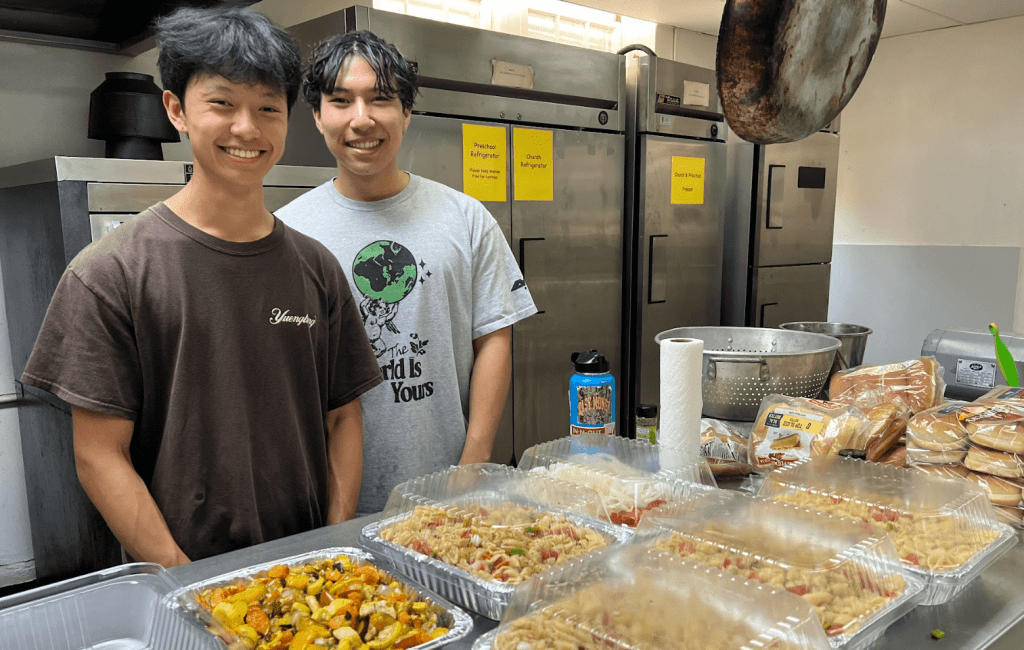Written by Office of Sustainability student associate, Faith Phillips, Class of 2024.
According to Feeding America, almost 120 billion pounds of food go to waste annually which equates to over 40% of all food in America. At WashU, two groups on campus are doing their part to decrease food waste in St. Louis and instead reroute recovered food to families in the city. One of the groups in this partnership is Burning Kumquat (BK), a WashU student-run urban garden founded in 2007, that aims to share the joy of fresh vegetables. They have worked with local branches of food banks to donate the produce they harvest. The other partner is the Food Recovery Network (FRN) which is a national organization that has chapters across 179 college campuses. As a result of FRN’s national efforts, over 14.5 million pounds of food waste have been recovered, more than 12 million meals have been donated, and 6,500 metric tons of carbon dioxide emissions have been prevented. The WashU chapter of the FRN was founded in 2016 and has been working with on-campus dining halls to recover food and prepare meals.
These two organizations started working together in mid-September of this year. FRN recovers any produce Burning Kumquat has from their weekly harvests and uses it, alongside recovered food from campus, to prepare nutritious meals. With the help of volunteers, the food is donated to local shelters in the St. Louis area such as St. Patrick Center and Gateway 180. Any remaining produce is donated to food banks such as Metro Trans Umbrella Group.
I had the pleasure of speaking with one individual from each organization and learning more about their joint efforts. I spoke with Michelle Fath (she/her), co-president of Burning Kumquat and member since December 2021 and majoring in biology with a chemistry minor. I also spoke with Arjun Nair (he/him) who is the External President of the Food Recovery Network chapter at WashU and studying biology with a history minor.
While both organizations have similar goals, each has their own unique philosophy and processes for their work. Food Recovery Network is data-driven and weighs and records produce by item to share with the national organization. Last year, the WashU chapter of FRN recovered 730 pounds of food and is looking to beat that number this year. In the past month and a half alone, they have recovered over 50 pounds of produce from Burning Kumquat. They delivered 150 meals last year and have already beat that number with over 200 meals delivered in just the past month. Burning Kumquat tracks their production informally through photographs, as they see their purpose as a relaxing way for their members to interact with nature and they have historically deprioritized production optimization.
Both organizations have reached amazing milestones that highlight the impact of their efforts. Burning Kumquat collaborated with ArchEngage who helped them build a greenhouse in the garden. ArchEngage is a student group with a belief in community engagement through the design process. They connect students with professionals and local community members to create pro-bono design build projects in St. Louis. This upcoming winter will be the first time Burning Kumquat will get to use the greenhouse which allows them to garden year-round. The Food Recovery Network successfully rebuilt the organization post-Covid, after being shut down for a year. The FRN also received the Excellence in Leadership Award last semester from WashU and Arjun spoke on behalf of the group at ReFED Food Waste Solutions Summit on the panel entitled “The Future is Now: The Power of Indomitable Youth to Spark Action.” He talked about their experience in the food space and the impact they have made as a student-led organization.
While this partnership has only been ongoing for a few months, the representatives from both organizations have expressed how much each has learned from the other. Michelle discussed how BK has learned through this collaboration what produce is easier for bulk cooking. Because Burning Kumquat is unable to use all the produce in a week, they have started using the extra produce for cooking events for club members. BK has also learned how much of an impact their harvests can have on the St. Louis community. BK is a student-run organization with members involved in other activities with academic responsibilities, but they are still able to make major contributions that will benefit hundreds this year.
Arjun emphasized how Food Recovery Network has learned more about the produce they are able to grow in Missouri. Through this partnership with Burning Kumquat, FRN feels closer to the farming process they recover food from and that has increased their appreciation for the production process. The Food Recovery Network has also felt encouraged to continue their work through this process as they have seen the growing potential and impact of an urban garden for the St. Louis community. Looking to the future, Burning Kumquat is planning to build an herb spiral which is a structure that utilizes gravity for watering plants of different dryness needs. The Food Recovery Network aims to surpass the goal of 400 pounds of recovered food this semester and continue to prepare meals on a weekly basis.
These organizations rely on their passionate and dedicated student members to enact change within the St. Louis community through their work in food recovery and meal donations. If students want to get involved in Burning Kumquat, they should follow their Instagram @theburningkumquat and join the GroupMe through the link in their bio on Instagram for more announcements and updates. For students wanting to get involved in the Food Recovery Network, they can join the mailing list on WUGO or send an email to washucampuskitchen@gmail.com. They just had a Pie Caramba event on November 5th where volunteers prepared a Thanksgiving meal and baked pies for shelters. There is an upcoming cookie decorating event at the end of the semester and more information can be found on their Instagram @washu_frn.
